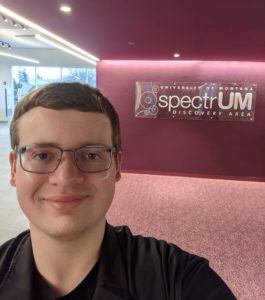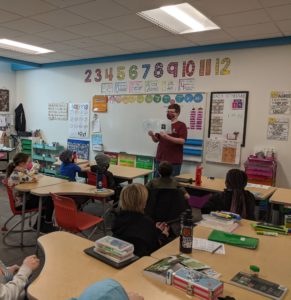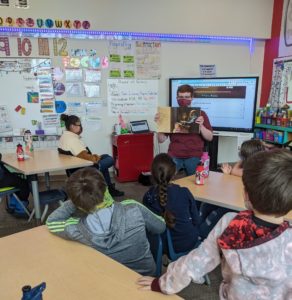The Power of Empathy: Reflections on MLK Read for Peace by Jonathan Carter

The recent wave of school boards nationwide removing books from curricula (and even from libraries themselves) has prompted me to reflect further on the significance of MLK Read for Peace. This service project connects community volunteers with kindergarten through fifth-grade classrooms to read age-appropriate books and honor the legacy of Dr. King. Montana Campus Compact hosts this event in elementary schools across Montana to commemorate AmeriCorps and The King Center’s Martin Luther King Jr. Day of Service. While many schools enjoy a day off in observation of MLK Day, students may not appreciate the meaning of the holiday since Dr. King’s work is rarely a requirement for elementary curricula.
For my part, I visited three classrooms across two elementary schools in Missoula. On January 14th, I traveled to Lowell Elementary School and read children’s books about Dr. King’s life to third and fourth graders. Afterward, the teachers and I facilitated discussions about the American Civil Rights Movement and the enduring legacy of Dr. King and his contemporaries. I was impressed by the young students’ level of engagement with the activity and thoughtful comments about social justice. One recurring theme was students struggling to understand why anyone would ever think one particular race is inherently superior to any other. Treating someone differently based solely on their eye or hair color would be ridiculous, they told me, and racial discrimination is similarly nonsensical.

Then on January 17th, I visited virtually a classroom of second graders at Hellgate Elementary School. In all three classes, students wrote and shared poems about their definitions of peace, and how they can promote peace in their daily lives. One boy remarked that his incessant fights with his brother informed his vision of peace: “not having any siblings.” In addition to providing more context about the significance of MLK Day, I hope that my service inspired further conversations about racial injustice and how we can all act as allies to support historically marginalized communities. After all, creating a more just society is a yearlong commitment that extends far beyond a single day of service.

I would like to think that such an event would be universally embraced and supported by Montana communities, yet I found a handful of “angry” emoji reactions on local news coverage. Children’s books about the history of the American Civil Rights Movement make some of our fellow citizens… “angry”? How sad that this anger is caused by (again, age-appropriate) discussions about peace, racism, and nonviolent resistance. It seems the “angry” reactors would prefer to pretend that the darker chapters of American history were somehow less egregious than the history books state. I can understand the appeal of living in an idealized fantasy that strongly emphasizes the United States government’s successes and glosses over its failures. But twisting history to accommodate one’s preferred narrative and worldview is a monumental disservice to our children.
Acclaimed author Clint Smith recently shared a thread on Twitter that resonated with me: “When I was a high school English teacher, I was constantly blown away by how willing and how eager my students were to grapple with the difficult topics and questions that arose from books we read. Young people are capable of far more than many adults often give them credit for. Banning books that expose students to the atrocities and inequities of our world does not protect them. If anything, it leaves them less equipped to understand why our society looks the way that it does today. Teaching these histories honestly helps them make sense of who we are.” My conversations during MLK Read for Peace demonstrated that even elementary students are thinking about difficult topics like racial injustice, and they have questions to ask. Who do you trust to be a more balanced and reliable source of information: the YouTube comments section or your child’s teacher?
Serving every day at a children’s science museum located in a library, I firmly believe in the power of education and young people to change the world. As such, I am deeply disappointed by misguided (and often suspiciously bad-faith) bans of any books that may cause “discomfort”—for, let’s be clear, white people. Banning Toni Morrison and Angie Thomas from library bookshelves strikes me as an embodiment of (white) parents’ fear that works by such authors will inspire their children to ask a tough question at the dinner table that they would much rather avoid. As a straight, white male who attended a small high school in rural Indiana, I actively seek out media that explores race, gender, and sexuality because I acknowledge that my perspective has some room for growth. Does watching Do the Right Thing and Get Out make me feel like an “oppressor”? Of course not. Instead, I develop a more robust sense of empathy and feel frustrated that the United States still struggles with the same persistent challenges of racism, sexism, and heterosexism.
Empathizing with the perspective of someone who identifies differently than I do can be a profound experience. The late Roger Ebert said it best: “We all are born with a certain package. We are who we are: where we were born, who we were born as, how we were raised. We’re kind of stuck inside that person, and the purpose of civilization and growth is to be able to reach out and empathize a little bit with other people. And for me, the movies are like a machine that generates empathy. It lets you understand a little bit more about different hopes, aspirations, dreams and fears. It helps us to identify with the people who are sharing this journey with us.” In my experience, it is this ability of literature to generate empathy with historically marginalized communities that frightens parents who have—shall I say—less inclusive worldviews. The psychological sciences student in me knows that it is much easier to denigrate an outgroup when its members are reduced to dehumanized caricatures. There is any number of things about which we can sensibly disagree, but human rights and basic respect for all people are two things that are simply nonnegotiable.
Throughout the first five months of my AmeriCorps service term at spectrUM, I have witnessed firsthand the ability of service to unify Americans of vastly different backgrounds and experiences. In a statement released on MLK Day, AmeriCorps CEO Michael D. Smith wrote, “When Dr. King spoke at the March on Washington, he described a ‘fierce urgency of now.’ More than 50 years later, his words remind us that we are stronger when we march forward, together.” Surveys of American history are welcome to celebrate Brown and Obergefell as examples of our nation’s moral progress, but that story is woefully incomplete if it refuses to also grapple with the shameful legacies of Plessy and Korematsu. I don’t pretend to have all the answers, but I do know that to create the Beloved Community of Dr. King’s dream, we must not be afraid to ask tough questions about who we are and how exactly we arrived at the present. These conversations are essential for personal and collective growth, even when they’re difficult. And especially when they’re uncomfortable.
 Blog
Blog